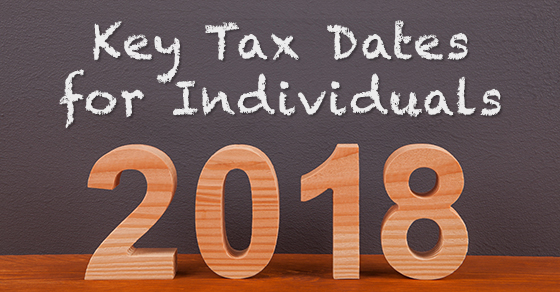Get started on 2018 tax planning now!
With the April 17 individual income tax filing deadline behind you (or with your 2017 tax return on the back burner if you filed for an extension), you may be hoping to not think about taxes for the next several months. But for maximum tax savings, now is the time to start tax planning for 2018. It’s especially critical to get an early start this year because the Tax Cuts and Jobs Act (TCJA) has substantially changed the tax environment.
Many variables
A tremendous number of variables affect your overall tax liability for the year. Looking at these variables early in the year can give you more opportunities to reduce your 2018 tax bill.
For example, the timing of income and deductible expenses can affect both the rate you pay and when you pay. By regularly reviewing your year-to-date income, expenses and potential tax, you may be able to time income and expenses in a way that reduces, or at least defers, your tax liability.
In other words, tax planning shouldn’t be just a year-end activity.
Certainty vs. uncertainty
Last year, planning early was a challenge because it was uncertain whether tax reform legislation would be signed into law, when it would go into effect and what it would include. This year, the TCJA tax reform legislation is in place, with most of the provisions affecting individuals in effect for 2018–2025. And additional major tax law changes aren’t expected in 2018. So there’s no need to hold off on tax planning.
But while there’s more certainty about the tax law that will be in effect this year and next, there’s still much uncertainty on exactly what the impact of the TCJA changes will be on each taxpayer. The new law generally reduces individual tax rates, and it expands some tax breaks. However, it reduces or eliminates many other breaks.
The total impact of these changes is what will ultimately determine which tax strategies will make sense for you this year, such as the best way to time income and expenses. You may need to deviate from strategies that worked for you in previous years and implement some new strategies.
Getting started sooner will help ensure you don’t take actions that you think will save taxes but that actually will be costly under the new tax regime. It will also allow you to take full advantage of new tax-saving opportunities.
Now and throughout the year
To get started on your 2018 tax planning, contact us. We can help you determine how the TCJA affects you and what strategies you should implement now and throughout the year to minimize your tax liability.


 A review of significant TCJA provisions affecting small businesses
A review of significant TCJA provisions affecting small businesses

